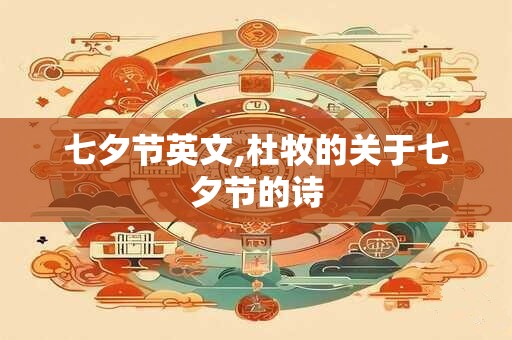As the stars twinkle brightly in the night sky, the Qixi Festival, also known as Chinese Valentine's Day, is a time when love and romance are celebrated in China. This festival, steeped in ancient tradition, is named after the legendary story of the weaver girl, Zhinu, and the cowherd, Niu Lang. One of the most famous poets to have written about this romantic occasion was Du Mu, a Tang Dynasty poet whose verses capture the essence of the Qixi Festival.
The Legend of Zhinu and Niu Lang
The story of Zhinu and Niu Lang is a tale of love that transcends the boundaries of the heavens and the earth. According to the legend, Zhinu was a celestial weaver who lived in the clouds. She was the daughter of the emperor of the sky, and her weaving was so exquisite that she was beloved by all the gods. However, Zhinu fell in love with Niu Lang, a humble cowherd who worked on the earth below.
Despite the celestial and earthly divide, their love was pure and strong. One day, the emperor of the sky discovered their forbidden love and separated them, allowing them to meet only once a year on the seventh day of the seventh lunar month, which is the Qixi Festival. The magpies, moved by their love, would form a bridge across the Milky Way, allowing them to reunite.
Du Mu's Poem: "Qixi Festival"
Du Mu, a renowned Tang Dynasty poet, penned a poem that beautifully encapsulates the spirit of the Qixi Festival. His verses, rich with imagery and emotion, capture the essence of the romantic occasion.
> "In the middle of the seventh moon, stars in the sky,
> Weavers in the clouds, cowherds on the ground.
> The magpies form a bridge across the Milky Way,
> Zhinu and Niu Lang meet, love's destiny."
The Significance of the Qixi Festival
The Qixi Festival is not only a celebration of love but also a time to honor the purity and strength of romantic relationships. It is a time when young couples, and even singles, come together to express their love and admiration for one another. Traditional customs include giving gifts, making paper lanterns, and writing love letters.
Celebrating the Qixi Festival
Today, the Qixi Festival is celebrated in various ways across China. Here are some of the most popular activities:
1. Offering Ropes to the Weaving Goddess
One traditional practice is to offer ropes to the weaving goddess. It is believed that by doing so, one can improve their weaving skills and have their wishes for a happy marriage granted.

2. Making Paper Lanterns
Another popular activity is making paper lanterns. These lanterns are often decorated with symbols of love and romance, such as hearts and flowers. They are then released into the sky, symbolizing the couple's wish for a bright and happy future together.
3. Writing Love Letters
In the past, young men and women would write love letters to their crushes on the Qixi Festival. These letters were often hidden in a tree or left under the pillow of the intended recipient, hoping to initiate a romance.
4. Romantic Dates
Modern couples often use the Qixi Festival as an opportunity to go on a romantic date. This may include a candlelit dinner, a walk in the park, or a visit to a romantic spot in their city.
The Qixi Festival in the Modern World
In recent years, the Qixi Festival has gained international attention, and it is now celebrated by Chinese communities around the world. The festival has even been recognized by UNESCO as part of the Intangible Cultural Heritage of Humanity.
Conclusion
The Qixi Festival, with its rich history and romantic tales, continues to be a cherished tradition in China. Du Mu's poem, with its timeless beauty, captures the essence of this special occasion. Whether you are celebrating with a loved one or simply reflecting on the beauty of love, the Qixi Festival is a time to appreciate the magic and wonder of the romantic spirit.
